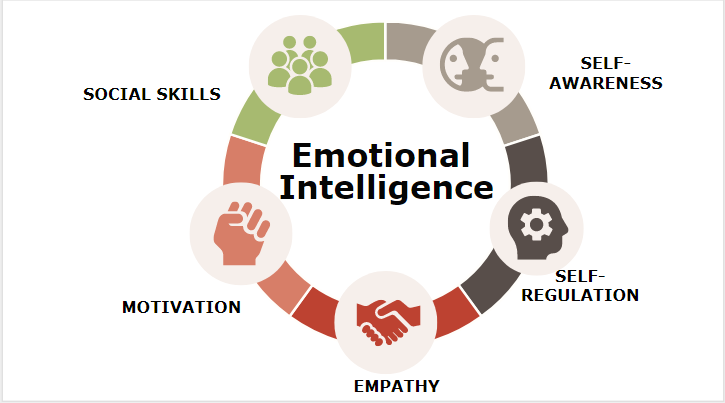-
26 Aug 2024
GS Paper 4
Theoretical Questions
Day 43: Discuss the main components of emotional intelligence. How will you apply emotional intelligence in administrative practices? (150 words)
Approach
- Start with a brief definition of emotional intelligence.
- Discuss the main components of emotional intelligence.
- Highlight the application of EI in administrative practices.
- To conclude, emphasize the long-term benefits of incorporating emotional intelligence into administrative roles.
Introduction
Emotional Intelligence (EI) is the ability to recognize, understand, manage, and effectively use emotions in oneself and others. It is a crucial aspect of leadership and administration as it directly influences interpersonal relationships, decision-making, and overall organizational health.
Body
Main Components of Emotional Intelligence
- Self-awareness: Self-awareness involves recognizing and understanding one’s own emotions and their impact on thoughts and behavior.
- This includes self-assessment, self-confidence, and emotional awareness.
- Self-Regulation: Self-regulation refers to managing one’s emotions in a constructive manner and maintaining control over one’s responses.
- It includes self-control, adaptability, and integrity.
- Motivation : Motivation involves the drive to achieve goals with energy, enthusiasm, and persistence.
- This includes achievement drive, commitment, and initiative.
- Empathy: Empathy is the ability to understand and share the feelings of others, leading to better interpersonal interactions and support.
- This involves organizational awareness and service orientation.
- Social Skills: Social skills encompass managing relationships and building networks effectively.
- This includes communication, conflict management, leadership, and influence.
Applying Emotional Intelligence in Administrative Practices
- Improving Team Dynamics:
- Utilize self-awareness and empathy to understand team members’ needs and emotions, fostering a supportive and cohesive work environment.
- Kiran Bedi, the first woman to join the Indian Police Service (IPS), utilized her emotional intelligence as Inspector General of Prisons in Tihar Jail to enhance the jail environment by addressing the emotional and psychological needs of both staff and inmates
- Utilize self-awareness and empathy to understand team members’ needs and emotions, fostering a supportive and cohesive work environment.
- Enhancing Communication Channels:
- Employ social skills to improve communication channels and ensure clear, transparent exchanges of information.
- Organize open meetings where team members can freely express their ideas and concerns, promoting transparency and mutual understanding.
- IAS officer Armstrong Pame showcased remarkable emotional intelligence and communication skills by building a 100 km road linking Manipur to Nagaland and Assam, using crowdfunding and contributions from businesses and local leaders.
- Effective Conflict Resolution :
- Use self-regulation and social skills to manage and resolve conflicts in a constructive manner.
- Rajiv Gauba, Secretary of the Ministry of Home Affairs, exemplified emotional intelligence during the COVID-19 pandemic by managing conflicts between state governments and central authorities through understanding diverse viewpoints and facilitating collaborative discussions.
- Use self-regulation and social skills to manage and resolve conflicts in a constructive manner.
- Driving Change and Innovation:
- Lead a change management process by addressing team members’ concerns, providing support, and maintaining high levels of engagement and morale.
- Sandeep Nanduri, IAS, launched Café Able in Tamil Nadu, designed to be run by differently-abled individuals, with the goal of enhancing their confidence, encouraging entrepreneurial spirit, and promoting self-reliance.
- Lead a change management process by addressing team members’ concerns, providing support, and maintaining high levels of engagement and morale.
- Fostering a Positive Work Environment:
- Apply empathy and social skills to cultivate a work culture that promotes collaboration, respect, and overall job satisfaction.
- Implement team-building activities that enhance interpersonal relationships and create a more inclusive and supportive work atmosphere.
- The introduction of the Swachh Bharat Mission saw IAS officers implementing various team-building activities and creating a positive work culture.
Conclusion
Emotional Intelligence is integral to effective administration, as it enhances the ability to manage teams, navigate conflicts, and foster a positive organizational culture. By understanding and applying the components of EI—self-awareness, self-regulation, motivation, empathy, and social skills—administrators can improve their decision-making, relationships, and overall effectiveness in their roles. Incorporating EI into administrative practices leads to better team performance, higher employee satisfaction, and a more harmonious work environment





